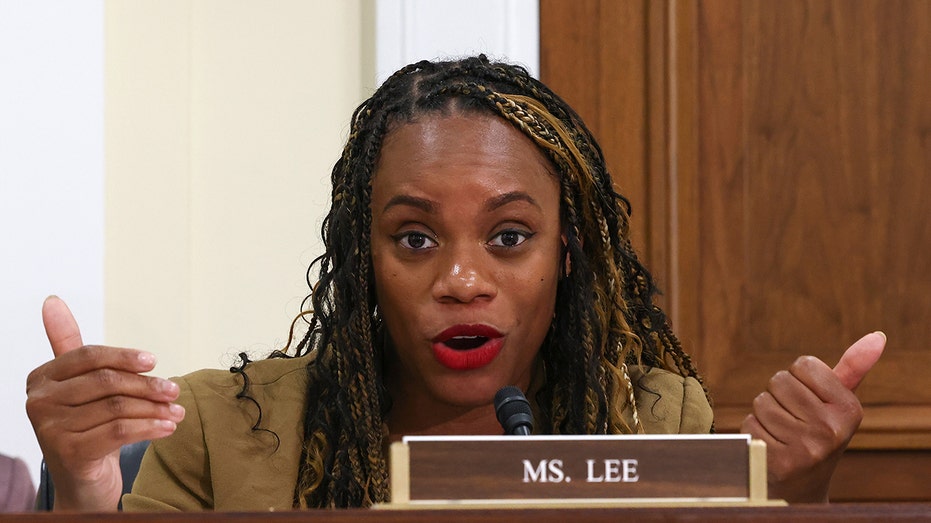- BlackVoter.Org
- Posts
- BlackVoter.Org
BlackVoter.Org


Rep. Summer Lee (D-PA) is gearing up to introduce a bold reparations resolution this week, asserting it’s a “moral and legal obligation” for the U.
S. to allocate “trillions” in reparations for Black Americans.
Citing historical injustices like Jim Crow laws, she emphasizes the urgency of reshaping society for future generations. This move coincides with other prominent Democrats, such as Sen.
Cory Booker and Rep. Ayanna Pressley, advocating similar initiatives aimed at addressing systemic racism and its lingering effects.
Following a recent congressional briefing titled “We Can’t Wait: Advancing Reparative Justice in Our Lifetime,” proponents aim to establish a federal commission focused on examining the legacy of slavery and proposing reparation strategies. With Lee decrying the previous administration's rollback of equity measures, the push for reparations signals a broader movement towards acknowledging and addressing America’s painful history of racial injustice.

In an ambitious push for racial justice, Rep. Summer Lee (D-Pa.
) is set to introduce a resolution calling for trillions in reparations for Black Americans. Highlighting the historical injustices of slavery and Jim Crow laws, Lee emphasizes this initiative as a "moral and legal obligation" of the U.
S. government.
At a recent Capitol Hill event titled "Why We Can’t Wait: Advancing Reparative Justice in Our Lifetime," she rallied support from fellow lawmakers and activists, insisting on the urgent need to reshape societal structures toward equity. Lee's proposal seeks to rectify the systemic inequalities that persist today, framing it as a crucial moment for societal transformation.
This initiative follows Rep. Ayanna Pressley's earlier call for a federal commission to explore reparations, underscoring a growing momentum among Democrats advocating for comprehensive reparative measures.
Together, these voices highlight a powerful call to confront America's legacy of racism head-on.

The University of Southern Mississippi celebrated the remarkable achievements of Clarence Magee by awarding him an honorary doctorate during the spring commencement. Recognized for his significant contributions to education and civil rights, Magee’s journey began in Columbia, Mississippi, where he became the first in his family to attend college.
His career spanned teaching in local schools and serving the community through various public service roles. Notably, he played a pivotal role in initiatives like the P.
A.C.
E. Head Start program and the development of affordable housing in Hattiesburg.
A long-time leader at the NAACP and a key figure in the fight for voter registration rights, Magee’s legacy serves as a powerful reminder of courage and persistence in the ongoing pursuit of justice and equality. His dedication continues to inspire future generations as he emphasizes the need to invest in the ideals of freedom and community service.

In the wake of Trump’s election, Arab and Black communities in Dearborn, Michigan, are grappling with a political rift that has left deep emotional scars. Tensions soared when Arab-American voters, frustrated with the Democratic Party's stance on Gaza, shifted their support, contributing to Trump’s unexpected victory in the state.
This discord was evident during a recent Iftar, organized to foster dialogue and healing. Attendees engaged in candid conversations about the shared struggles of their communities against oppression, all while savoring traditional dishes.
The event highlighted the importance of solidarity amidst differing priorities and grievances. As the communities began to address their pain and fears, participants expressed a desire to forge a more united future, acknowledging that their fates are interconnected.
With open-hearted discussions, they aim to transcend historical divides and promote understanding, emphasizing that collective action is essential for both communities moving forward.

In April 2025, Black women faced unprecedented job losses amid ongoing economic instability in the Trump administration's labor market. Employment figures from the U.
S. Bureau of Labor Statistics indicated a staggering decline, with 106,000 jobs shed, pushing their unemployment rate from 5.
1% to 6.1%—the sharpest rise among any demographic.
Despite the overall economy adding jobs, Black women are grappling with dual barriers of racial and gender discrimination, contributing to their significant struggles in securing workplaces. Meanwhile, the broader Black unemployment rate climbed to 6.
3%, showcasing mounting challenges for this demographic. Experts attribute these setbacks to cuts in diversity, equity, and inclusion roles, alongside a decline in federal employment opportunities.
As the nation wages a war against inequity, the data evokes a sense of urgency to address systemic barriers and support Black women's participation in the workforce.

In a provocative analysis, Vox explores the contentious framing of white South Africans, particularly Afrikaners, as refugees under the Trump administration. Historian Jacob S.
Dlamini argues that this narrative distorts the legacy of apartheid and ignores the prevailing privilege many white South Africans still hold. While millions globally face genuine peril, including those in the DRC and Afghanistan, Trump has spotlighted Afrikaners as victims of a so-called "genocide," despite statistics indicating they are not disproportionately victimized by crime.
Dlamini emphasizes that this selective refugee policy is rooted in white supremacy and obscures the historical injustices of apartheid. As the U.
S. welcomes these individuals while turning away countless others in dire need, Dlamini warns of the moral implications, framing it as an affront to the memory of apartheid's victims.
This situation invites a deeper reflection on privilege, power, and historical accountability in today's socio-political landscape.

In a surprising move, the U.S.
Naval Academy has banned Bakari Sellers’ memoir, "My Vanishing Country," alongside nearly 400 other titles, as part of a controversial "DEI purge" mandated by Defense Secretary Pete Hegseth. Sellers' poignant account of growing up Black in rural South Carolina stands in stark contrast to JD Vance’s "Hillbilly Elegy," which remains available.
This decision has sparked outrage, as Sellers argues it reflects a troubling pattern of erasing narratives from marginalized communities. He captures the irony of how the story of White Appalachia is celebrated, while that of Black Southerners faces censorship.
The Naval Academy has not provided a clear explanation for the ban, prompting Sellers to express concern over the implications for cultural understanding within the military. As discussions about diversity and inclusion intensify, the ban raises important questions about whose stories are deemed worthy in American literature.